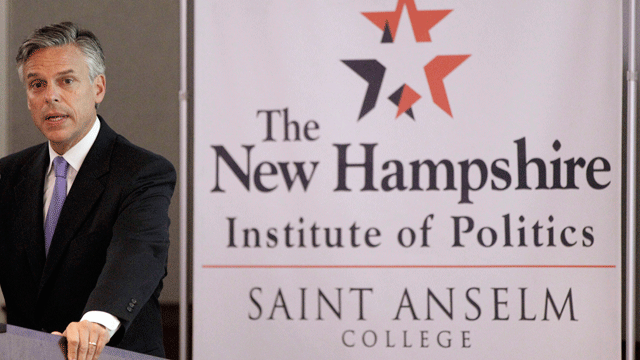
Republican presidential candidate former Utah Gov. Jon Huntsman speaks at the New Hampshire Institute of Politics in Manchester, N.H., Thursday afternoon, Oct. 13, 2011.
Jon Huntsman is defiant, even as his presidential campaign limps along.
"I don't care whether you're Republican, whether you're independent, whether you're Democrat, I want to get your vote. But I'm going to tell you right at the outset, I'm not going to pander," the GOP candidate told about 100 New Hampshire Rotary Club members one recent day. "I'm not going to sign meaningless pledges, and I'm not going to journey to New York to meet with Don Trump."
"There are just some things that I will not do," he adds.
It's a message that Huntsman hopes will resonate with this state's moderate Republicans and independent voters who will play a prominent role in its rapidly approaching presidential primary. And it provides a window into his last, best chance at keeping his presidential hopes alive -- a come-from behind New Hampshire victory that would deal a blow to Mitt Romney and catapult Huntsman into the driver's seat of the GOP nomination fight.
Two weeks have passed since the former Utah governor moved his national headquarters from sunny Florida to the aging former industrial center that is Manchester, N.H.
It was a move of necessity.
He is shedding campaign staff by the dozen. His campaign debt totals about $890,000, even after he gave it more than $2 million of his own money, according to new finance reports. And Huntsman, the Obama administration's former ambassador to China, is barely registering in national polls.
But he's inching up in surveys here, where it matters most as he looks to challenge Romney on what's essentially the former Massachusetts governor's home turf. Huntsman declared himself a "top-tier" candidate in New Hampshire late last week. And while that may be too rosy of a characterization, it's true that many voters here remain undecided -- and that gives Huntsman hope in a state that four years ago brought a broke and battered John McCain back from the political graveyard.
"We're all hearing from the national media that Romney's dominating, but as a resident of New Hampshire, I'm really undecided," Nancy Novelline Clayburgh, the assistant mayor of Portsmouth, said after the Rotary Club luncheon. "I'm open to Huntsman, Cain. I like Romney a lot."
Strapped for cash and unable to pay for TV ads, Huntsman faces a challenge of swaying undecided voters like her on the cheap -- one voter at a time and through the media.
That means a punishing campaign schedule.
Last week alone, he hosted seven town hall-style meetings in the state -- more than most of his rivals have hosted all year here -- and delivered four speeches. He also debated alongside his rivals at Dartmouth College. And he plans to boycott Tuesday's debate in Nevada in favor of hosting another New Hampshire gathering.
In some cases, he's drawing large crowds. But his campaign acknowledges that the many voters here still don't know who he is. And it's tough to win an election as an unknown.
"There's obviously movement in the right direction," spokesman Michael Levoff says of local polls that show Huntsman hovering under 10 percent. "But we're talking about a man who has name ID in the 20s."
So what's the clear strategy to boost his profile?
His campaign can't say.
Some allies have pushed the former ambassador to put more of his own money into the campaign, which would give him more time to meet with voters, one-on-one.
They also have pushed him to start running television commercials to introduce himself. The logic is that he needs voters to know who is before they can decide if they like him.
But that takes money -- and he's doesn't have it.
Aides concede there simply isn't the cash necessary to run television advertising any time soon. Privately, they're hoping that a pro-Huntsman super PAC -- which can raise and spend unlimited amounts of money on behalf of a candidate as long as there is no coordination -- will come to their rescue.
Huntsman said last week that he likely was done spending his own money.
"You never want to say never, but I've basically put in what I'm going to put in," he told the AP at the Rotary Club event late last week. "Campaigns are always concerned about money. We're on the ground. We've got the people we need to get the work done. Now it's about getting votes," he told the AP.
But early missteps exacerbated by high expectations have made that tough.
In the campaign's infancy this summer, aides spent lavishly and planned for multiple offices around New Hampshire. They bought mounds of promotional material -- signs in various designs and sizes, stickers, and souvenirs such as key chains. Last month, Huntsman fired his top New Hampshire aide and brought in a former aide to McCain, the senator from Arizona and the GOP's 2008 presidential candidate.
Saturday's campaign finance report showed Huntsman's operation in debt and struggling to find donors. His campaign said Friday it had just $327,000 in the bank.
And while Huntsman's advisers cast the campaign's relocation to New Hampshire as a sign of confidence that his concentrated approach would appeal to the voters here, it hardly masked the very real troubles besetting his campaign.
Dozens of Florida-based aides didn't make the move; the campaign could not afford them.




